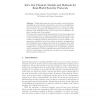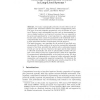718 search results - page 14 / 144 » Operational Semantics of Security Protocols |
142
Voted
TPHOL
2009
IEEE
15 years 9 months ago
2009
IEEE
Traditional security protocols are mainly concerned with key establishment and principal authentication and rely on predistributed keys and properties of cryptographic operators. I...
113
Voted
CONCUR
2008
Springer
15 years 4 months ago
2008
Springer
Abstract. For many cryptographic protocols, security relies on the assumption that adversarial entities have limited computational power. This type of security degrades progressive...
119
Voted
CSREASAM
2006
15 years 4 months ago
2006
A mobile ad hoc network is a self-organizing network that relies on the cooperation of participating nodes in order to function properly. In this network, mobile users arrive withi...
100
Voted
FOSSACS
2004
Springer
15 years 8 months ago
2004
Springer
Abstract. Using a probabilistic polynomial-time process calculus designed for specifying security properties as observational equivalences, we develop a form of bisimulation that j...
108
Voted
ATAL
2005
Springer
15 years 8 months ago
2005
Springer
Tuple spaces and the associated Linda language are a popular model for distributed computation, and Law-Governed Linda (LGL) is a variant allowing processes to have differential ...


